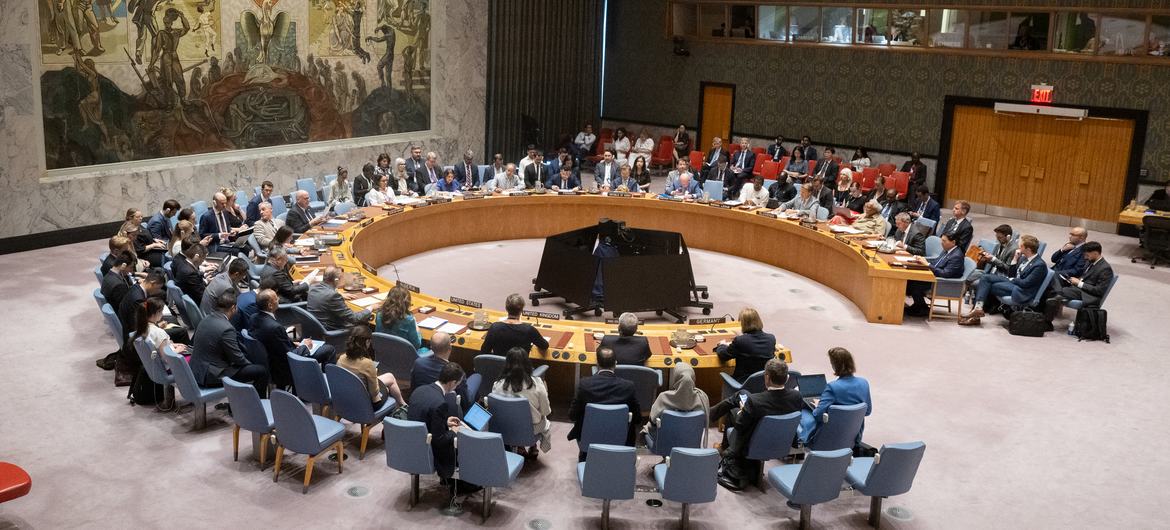| 联系我们 |

Tel:347-721-5583
Email:ustsgl@yahoo.com
网址:www.ustsgL.com
|
|
|
| 新闻动态
- 最新活动 |
Iran Nuclear Deal in Crisis: Europe Pushes Sanctions, Russia & China Seek Extension |
Iran Nuclear Deal in Crisis: Europe Pushes Sanctions, Russia & China Seek Extension 📍 United Nations Headquarters, New York – September 10, 2025Following this summer’s U.S. and Israeli airstrikes on Iran’s uranium enrichment facilities, the fragile diplomatic framework surrounding the Iran nuclear deal (JCPOA) has entered its deepest crisis since 2015.The Snapback DebateOn August 28, the UK, France, and Germany formally notified the UN Security Council that Iran was in “significant non-compliance” with the deal and demanded the reimposition of sanctions under the “snapback” mechanism.This mechanism, created by Security Council Resolution 2231, allows any JCPOA participant to trigger a process under which prior UN sanctions automatically “snap back” into place after 30 days—unless the Council explicitly votes to extend their termination.UK Ambassador Barbara Woodward, flanked by her French and German counterparts, told reporters:“Iran has failed to meet nearly all of its JCPOA commitments since 2019. It continues to stockpile highly enriched uranium without any credible civilian justification, blocks IAEA access, and is the only non-nuclear-weapon state producing weapons-grade material.”Iran Pushes BackIran’s UN Ambassador Amir Saeid Iravani rejected the move as “illegal and void,” arguing that:The European trio had themselves failed to uphold their commitments.The snapback process bypassed the JCPOA’s built-in dispute resolution mechanism.Resolution 2231 should terminate as scheduled on October 18, 2025.Iravani said:“This reckless attempt undermines diplomacy. Iran remains open to fair negotiations, but we will not negotiate under threats or coercion.”Russia and China Call for ExtensionIn direct contrast, Russia and China proposed a draft resolution to extend Resolution 2231 for six months—until April 18, 2026—with the option for further renewal. Their goal: buy time to resume diplomacy and prevent escalation.Russian Deputy Ambassador Dmitry Polyanskiy said:“The European move has no legal validity. Our joint proposal with China gives the international community a breathing space to avoid a serious crisis and maintain peace and security.”Iran welcomed the proposal as a “pragmatic step,” while dismissing European conditions for talks as “unrealistic.”A Race Against the Clock 📍 United Nations Headquarters, New York – September 10, 2025Following this summer’s U.S. and Israeli airstrikes on Iran’s uranium enrichment facilities, the fragile diplomatic framework surrounding the Iran nuclear deal (JCPOA) has entered its deepest crisis since 2015.The Snapback DebateOn August 28, the UK, France, and Germany formally notified the UN Security Council that Iran was in “significant non-compliance” with the deal and demanded the reimposition of sanctions under the “snapback” mechanism.This mechanism, created by Security Council Resolution 2231, allows any JCPOA participant to trigger a process under which prior UN sanctions automatically “snap back” into place after 30 days—unless the Council explicitly votes to extend their termination.UK Ambassador Barbara Woodward, flanked by her French and German counterparts, told reporters:“Iran has failed to meet nearly all of its JCPOA commitments since 2019. It continues to stockpile highly enriched uranium without any credible civilian justification, blocks IAEA access, and is the only non-nuclear-weapon state producing weapons-grade material.”Iran Pushes BackIran’s UN Ambassador Amir Saeid Iravani rejected the move as “illegal and void,” arguing that:The European trio had themselves failed to uphold their commitments.The snapback process bypassed the JCPOA’s built-in dispute resolution mechanism.Resolution 2231 should terminate as scheduled on October 18, 2025.Iravani said:“This reckless attempt undermines diplomacy. Iran remains open to fair negotiations, but we will not negotiate under threats or coercion.”Russia and China Call for ExtensionIn direct contrast, Russia and China proposed a draft resolution to extend Resolution 2231 for six months—until April 18, 2026—with the option for further renewal. Their goal: buy time to resume diplomacy and prevent escalation.Russian Deputy Ambassador Dmitry Polyanskiy said:“The European move has no legal validity. Our joint proposal with China gives the international community a breathing space to avoid a serious crisis and maintain peace and security.”Iran welcomed the proposal as a “pragmatic step,” while dismissing European conditions for talks as “unrealistic.”A Race Against the Clock
The Security Council now faces a ticking deadline:If no action is taken by September 27 (New York time), UN sanctions on Iran will automatically resume.If members approve the South Korea–led draft resolution to continue suspension, Iran would avoid sanctions.Alternatively, if the Russia-China extension plan gains traction, negotiations could be prolonged.But with five veto-wielding powers (U.S., UK, France, Russia, China) divided, the outcome remains highly uncertain.UN Secretary-General’s AppealUN Secretary-General António Guterres, through his spokesman Stéphane Dujarric, urged all parties to:Pursue diplomacy and prevent escalation.Ensure Iran’s nuclear program remains strictly peaceful.Use the next 30 days as “a window of opportunity” to find a peaceful path forward.“Every effort must be made to avoid another military confrontation and to prioritize dialogue,” Guterres warned.Breaking UpdateOn September 10, the International Atomic Energy Agency (IAEA) announced a new safeguards agreement with Iran, restoring inspections that had been suspended after the June strikes. The move could affect Europe’s decision on whether to press ahead with snapback sanctions.As the September 27 deadline approaches, the stakes grow higher:👉 Will sanctions automatically return?👉 Will Russia and China’s proposal delay the crisis?👉 Or will last-minute diplomacy keep the JCPOA alive?📡 Stay tuned — this is Times Square Global Live.
以色列和美国今夏轰炸伊朗铀浓缩设施后,伊核问题外交解决陷入危机。英、法、德三国指责伊朗严重违约,8月28日正式启动联合国安理会第2231号决议中的“快速恢复制裁”机制,要求恢复对伊朗的制裁。
根据机制,安理会须在30天内表决是否继续终止制裁,否则制裁将自动恢复。
伊朗方面强烈反对,指责三国无权启用该机制,并强调美国和欧洲国家首先违约。伊朗同时表示,仍愿通过外交解决,但不会接受威胁。
与此相对,俄罗斯和中国提出对第2231号决议进行“技术性延期”,建议将协议延长6个月,为外交谈判争取时间。
联合国秘书长古特雷斯通过发言人敦促各方保持克制,利用30天“机会窗口”通过谈判解决分歧,避免地区局势进一步升级。
目前,安理会可能面临三种选择:一是恢复制裁;二是延长协议;三是维持终止制裁。由于常任理事国间存在分歧,结果难以预测。
与此同时,国际原子能机构9月10日宣布已与伊朗恢复核查与监测活动,为缓解紧张局势带来一定希望。
最终,伊核协议的命运将取决于安理会在9月27日截止日期前的抉择。
|
|
 中文
中文  ENGLISH
ENGLISH